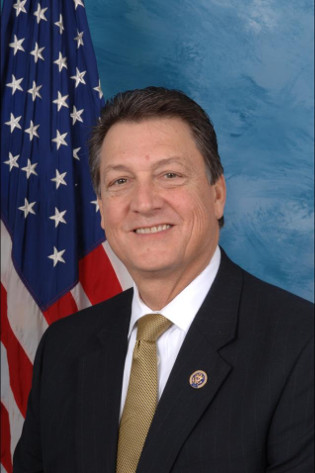Lynn Westmoreland Speaks Out Against RAWA, But for the Wrong Reasons
Former Georgia Republican Congressman Lynn Westmoreland spoke out against Sheldon Adelson’s Restoration of America’s Wire Act (RAWA) this week via an op-ed on TheHill.com. It is fantastic that one of the most conservative federal legislators of the last decade has expressed his distaste for Adelson’s anti-poker legislation, but what about his actual reasoning?
Let’s first take a moment to step back and look at who Lynn Westmoreland is, as it could explain his point of view on RAWA. He’s basically the epitome of the worst type of modern Republican. For example, down here in Georgia, gerrymandering has been an issue for years. Westmoreland actually fought against gerrymandering in the state in 2001 when Democrats controlled the Georgia House and the legislature was embarking on a redistricting effort. Of course, when Republicans regained control in 2004, he played a major part in redistricting the following year, gerrymandering which favored his political party and still does to this day.

Former Congressman Lynn Westmoreland (R – GA)
Image credit: wikipedia.org
Westmoreland, in typical religious right form, cosponsored a bill in the U.S. House that aimed to display the Ten Commandments in the House and the Senate. In 2006, he fought against the renewal of portions of the Voting Rights Act (hmm…that plus gerrymandering…voter suppression, anyone?).
And – get this – he signed a pledge to vote against climate change bills that might raise taxes. It’s a wonder he is not still in Congress.
Bottom line, Westmoreland was easily one of the most conservative members of the House last year.
That conservativism was on display in his op-ed piece. He stated, “I’ve seen a lot of unintended consequences of legislation that tried to do something big, but just ended up growing government. Most people can quickly name some examples: ObamaCare, taxes, regulations.”
He went on to explain that when he saw that RAWA had been reintroduced a couple years ago, he read it as “yet another example of a ‘special circumstance’ bill that would override decisions made by the people of individual states.”
He continued to talk about this as a states’ rights issue, which yes, I guess it is, but his angle on it is that he wants to stay away from “strong central government.”
Me personally, I look at online poker as an individual rights issue more than a states’ rights issue. Frankly, I think it’s a bunch of horseshit that we in the United States have to be “allowed” to play poker on the internet. And it’s an even larger bunch of horseshit that my ability to play in a five dollar Sit-and-Go could be determined by an octogenarian billionaire who is afraid (incorrectly, I might add) that some games on the internet will threaten his brick-and-mortar gambling empire.
So when Westmoreland started a sentence with, “While casino magnates like Sheldon Adelson may support outlawing online games as a way to drive business to their brick-and-mortar casinos,” I was encouraged.
But then he finished the sentence with, “….even Georgians who oppose gambling should recognize this as a subtle attempt to centralize even more power in Washington.”
No, that’s not it at all, Lynn. Sheldon Adelson and his cronies (including Republican Senator Lindsey Graham and Rep. Jason Chaffetz) are not trying to create a federal government that rules every part of our lives. They are trying to protect Adelson’s business interests. That’s it. Obviously, we can talk about how Republicans, the party of “small government” only want small government when it suits them, but are more than happy to let the federal government intrude on people’s lives when it serves them politically (see: gay marriage). And I suppose that is the case with RAWA, but it’s not big government for the sake of big government, like Westmoreland wants us to believe. It is big government for the sake of Sheldon Adelson and his Republican campaign money.
Westmoreland took his odd reasoning further:
Another Republican, Rep. Doug Collins, agrees. He is opposed to RAWA and any attempt to ram it through Congress. He also understands that it could have implications for our Second Amendment right to keep and bear arms by potentially ceding power to Congress to outlaw the online sale of ammunition, and on our First Amendment rights by giving Congress the right to legislate what happens on the Internet.
I am fully against internet censorship and totally on the side of net neutrality, but once again, Westmoreland is approaching this from the wrong angle. The effort by Adelson and some lawmakers to make RAWA into law is unlikely to start some slippery slope of federal government overreach because that’s not the goal. It COULD encourage further crony capitalism, which is different. I mean, do we really think that some Senators would say, “Well, we did Sheldon Adelson a favor and banned online poker, so that means we could definitely ban online bullet sales because BIG GOVERNMENT!”
“Legislation that opens the door to unintended consequences is the most dangerous kind of lawmaking effort in D.C.,” Westmoreland wrote.
No, crony capitalism is more dangerous because it has INTENDED consequences for terrible, greedy reasons. If a law has unintended consequences, those consequences can be remedied. But Westmoreland lets his ultra-conservative, “small government” political stance shield his view of the real problem. I appreciate that someone – especially someone whose political leanings directly oppose mine – has spoken out against RAWA, but I wish he did so for the right reasons.




















COMMENTS